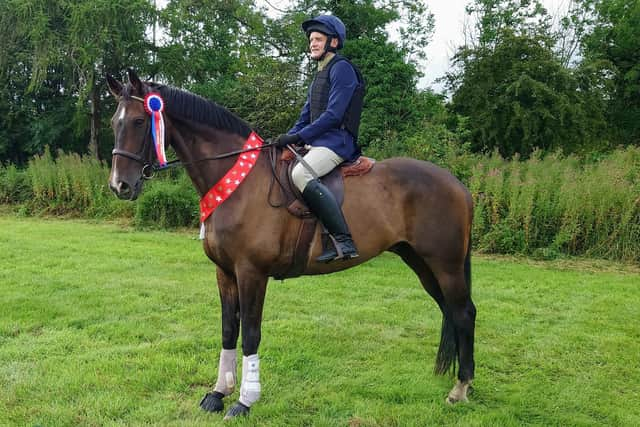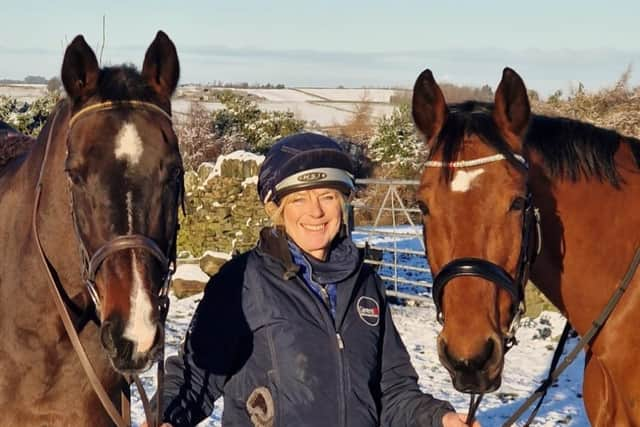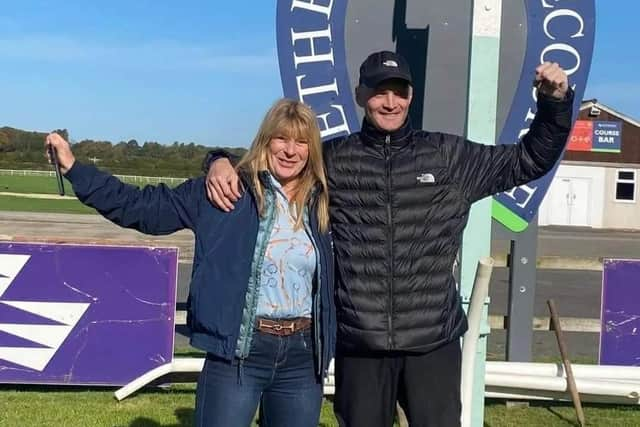From drink and drug addiction that nearly killed him to becoming an amateur jockey in a charity race
Steven Coyle and Alison Garner, who herself was diagnosed with breast cancer in 2021, were selected to take part in the British Horse Society’s third annual Northern Charity Race at Wetherby.
They lined up as two of 12 equestrians who have had to undergo training and fitness tests to take part in the one mile flat race alongside their normal jobs and day to day life.
Advertisement
Hide AdAdvertisement
Hide AdTo take part they have had to raise £2500 each in sponsorship and secure the trust of a racehorse owner and trainer to let them use one of their horses for the event.


Alison, a sports psychology coach, runs Brook Barn Equestrian Centre in Lodge Moor, Sheffield and Steven, originally from Newcastle, also now lives in Sheffield and has been working for Alison since the start of the first lockdown in 2020.
For many years Alison took part in eventing competitions and did think about becoming a point to point jockey but “never got round to it”.
The 58-year-old watched last year’s charity race but never expected to be taking part herself.
Advertisement
Hide AdAdvertisement
Hide AdShe said: “I have left it a bit late to be doing this but I just wish I had done it sooner. I love riding, it is such a sensation of freedom on the gallops and you are at one with the horse.


“I went to watch this last year because my friend was doing it and if somebody had said to me I would do it this year I wouldn’t have believed them.”
They saw the advert for the race just five days before the deadline for applications and within weeks were in full training, even hiring personal trainers.
For Steven, his first competition is a far cry from his life in Newcastle where he was experimenting with cannabis at the age of 13, which led to harder drugs and by the end of his teens he was using cocaine and drinking heavily.
Advertisement
Hide AdAdvertisement
Hide AdWhen a friend died in a car crash when they were both 16, he drank more and took more drugs but still managed to secure a place on an equine course at college but he was the victim of an assault which left him with a severe head injury and put an end to the course.


His recovery took more than a year and he started drinking more, taking more drugs and his life was spiralling out of control as he was in and out of prison and family relationships broke down.
The turning point was when another friend died and Steven believed he would be next. He asked his social worker for help and was placed on a five month programme of “hard detox” to clear his system and moved to supported housing.
He was told about a job ‘poo picking’ at an equestrian yard, he rang up and started the next day. From there he met Alison who offered him a job in her yard and to teach him how to ride.
Advertisement
Hide AdAdvertisement
Hide AdThat was in early 2020 and since then he has progressed to hacking out and then taking horses on the gallops.
Steven said: “I have only been riding three years and properly riding for about a year. It sometimes does not feel real. It is like a dream but it was my dream if that makes sense.
"I had always dreamt of working with horses but I never thought I would go down a proper race track on a racehorse and doing this sort of thing.
“I have gone from really bad addiction, close to death, a serious head injury, life support to poo picking and it kept going up levels from there. It was only meant to be for three months but I have been here for four years.”
Advertisement
Hide AdAdvertisement
Hide Ad“Horses have saved my life and I want to pass that knowledge that I have learned to the younger generation.
"If it wasn’t for this I would have been still addicted, dead or in prison - that is the reality. I did rehab with 50 people and I am the last one left. The rest died or are in prison.”
Money raised from the event will go towards the campaigns and causes that the British Horse Society backs such as improving the safety of UK riders while out on the roads, enhancing and maintaining the UK’s equestrian access network and horse w elfare.
The BHS responds to more than 6,000 welfare cases each year and works to promote the prevention of neglect, cruelty and harm to horses and provide support, advice and education to horse owners to try and remedy problems before they become too serious.
Advertisement
Hide AdAdvertisement
Hide AdThere is also a focus on Future Generations and how horses have a powerful way of inspiring disengaged young people to reconnect with society.
The Changing Lives through Horses programme aims to improve the lives of disengaged young people and give them the opportunity to develop skills that enable them to return to education and/or employment.
